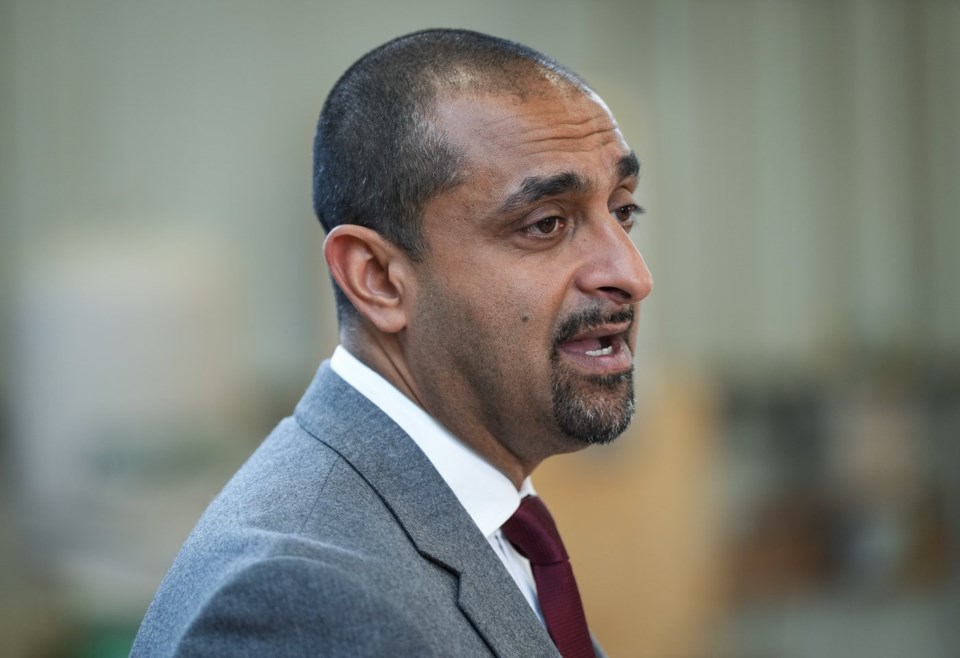VANCOUVER — British Columbia's government is forming a working group to tackle a number of safety issues in supportive housing, including concerns of drug trafficking, weapons and second-hand exposure to fentanyl.
Housing Minister Ravi Kahlon said Monday the government is also considering removing the facilities from the Residential Tenancy Act, which would allow housing providers to kick out dangerous people taking advantage of vulnerable tenants.
"These are concerns that have come from some of the not-for-profits that operate supportive housing," Kahlon said. "And what they say is that by having this exempt, that they would have the ability to better enforce rules around weapons at supportive housing sites."
He added that taking the housing out of the Residential Tenancy Act is just one of the solutions being considered, and the province is open to whatever the working group recommends.
"I've heard from some who say the rules are fine," Kahlon said, noting that others want change to strengthen safeguards.
"What I see in front of me is folks are smoking fentanyl in rooms when you're not allowed to," he said. "And that comes with some additional risks. We have to manage that."
The B.C. Ministry of Housing said it is working with the BC Centre for Disease Control to look into the impact of the toxic drug crisis on supportive housing.
It said that early results from testing 14 buildings in both Victoria and Vancouver show that some supportive housing areas may be "more likely to have elevated levels of airborne fentanyl, above the limit WorkSafeBC has established."
The announcement came after a number of recent incidents in supportive housing, including a fire on June 11 at the former Howard Johnson hotel in Vancouver that injured two people.
Fire crews said after the June fire that they have been called to the site more than 900 times since the facility was converted to supportive housing in 2020, and police also say they have been called to the location thousands of times during the same period.
Downtown business groups in Vancouver and Victoria have made recent pleas to government about doing more to address the public safety situation, with the deteriorating conditions severely hampering local shops' ability to continue operating.
Club owner Alan Goodall said in the aftermath of the June fire that his business on the ground floor of the former hotel suffered a collapsed ceiling from the blaze.
He said the operation had to close for 16 days in the month before the fire due to various issues with the building above him, resulting in 50 staff members being temporarily out of work.
Kahlon said that the working group will involve law enforcement, supportive housing providers, union representatives and BC Housing "to ensure safety for tenants and workers is paramount."
"We have heard from providers that they need more authority to take action and keep people safe and we will be working with our partners to find a path forward that ensures people can live in a safe, inclusive and supportive environment," Kahlon said.
"It's not entirely clear where this will land," he said about the working group's recommendations, adding there was no set date for its report.
"My hope is to be moving in either September or October on whatever changes are needed."
"This is not something that's going to take a long time, but we want to make sure that these things are being considered before we make any changes," Kahlon said.
If supportive housing were to be removed from the Residential Tenancy Act, the province will make sure residents' basic rights are protected.
"How do we ensure that they have some basic rights, but also how can we ensure that those who are working there and those who are operating these places can make sure that the rules are being followed?" he said. "And I think there's a balance we can strike."
The province said there have been almost 7,500 new supportive housing units opened in B.C. since 2017, and another 2,900 are in progress.
BC Non-Profit Housing Association chief executive Jill Atkey said in a statement that "the complexity of operating supportive housing has shifted in recent years," and the group is grateful that the province is working with providers "to find workable solutions."
This report by The Canadian Press was first published June 30, 2025.
Chuck Chiang, The Canadian Press



